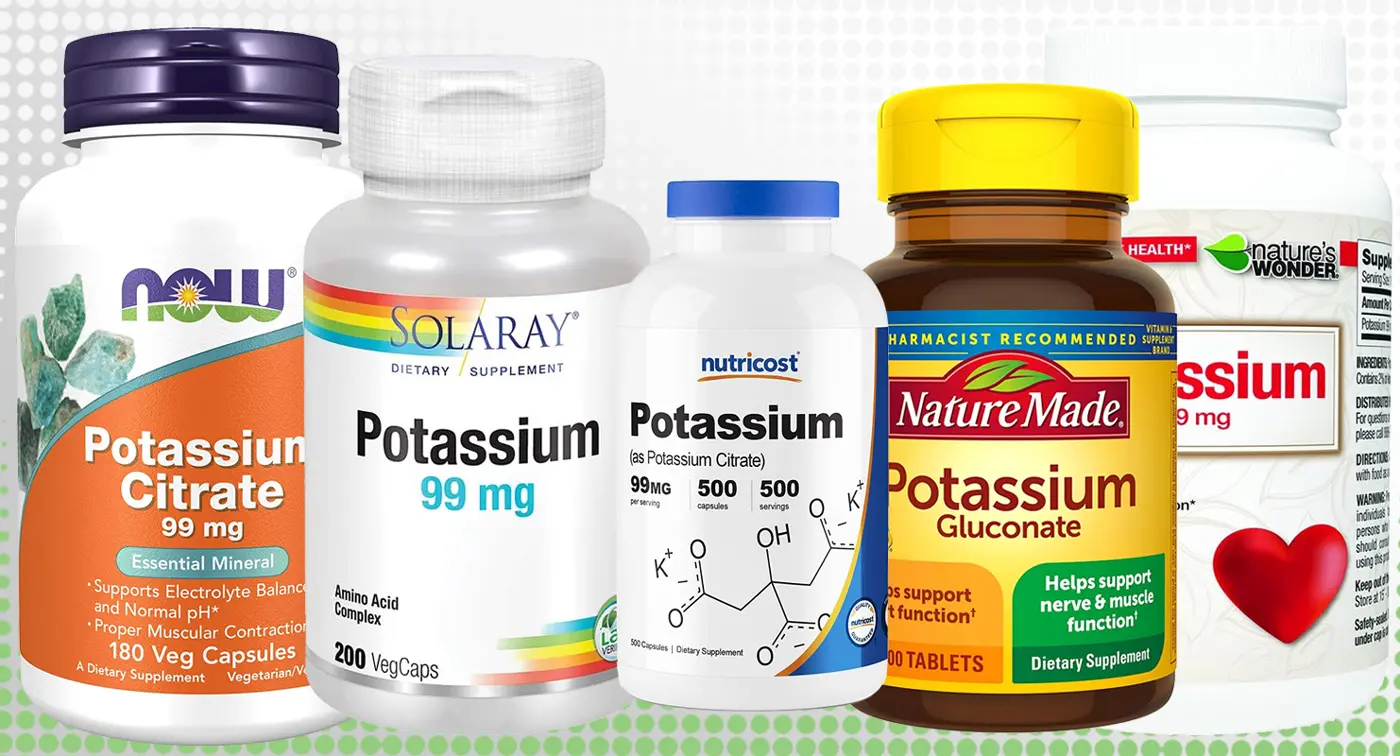A large percentage of the American population does not consume the recommended amount of potassium, an essential mineral, and electrolyte. According to research, the 2015–2020 Dietary Guidelines for Americans lists potassium as a “nutrient of public health concern”.
That’s why it’s so important to ensure that our diet is nutrient-rich in vitamins and minerals, especially due to modern Western nutrition habits. And although we’ve shared a quality selection of some of the best potassium supplements on the market, diet is always number one. In fact, according to an article published by the National Institutes of Health (NIH) Office of Dietary Supplements, most supplements don’t provide a significant boost in potassium levels mainly due to the dosages.
Does that mean it’s not worth it? Not at all. Supplements are made to be just that… a supplement to an already healthy lifestyle. So we’ve shared our list of the best products currently available on the market and stick around as we explain the many benefits of potassium.
Note: Consult with a medical prior to taking a potassium supplement if you have any known health conditions (especially kidney disease), take medications, or are pregnant.
- NOW Supplements Potassium Citrate Capsules – Buy here Editor’s Choice
- Nature’s Wonder Potassium Caplets – Buy here
- Nutricost Potassium Citrate Capsules – Buy here
- Nature Made Potassium Gluconate Tablets – Buy here
- Solaray Potassium Capsules – Buy here
- Thorne Research Potassium Citrate Capsules – Buy here
- 365 Everyday Value Potassium Tablets – Buy here
- Bulk Supplements Potassium Citrate Powder – Buy here
- Solimo (Amazon Brand) Potassium Caplets – Buy here
- EarthBorn Elements Potassium Bicarbonate Capsules – Buy here
Editor’s Choice – NOW Supplements Potassium Citrate Capsules
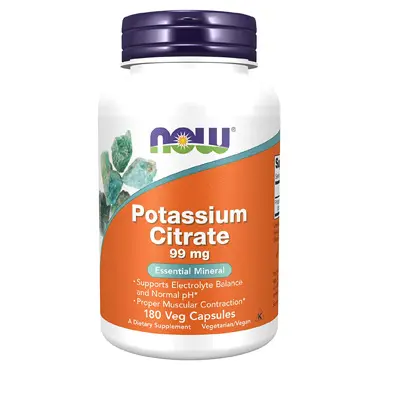
Now Supplements is a household name and trusted brand that makes some of the best quality products on the market. So it made sense to place their potassium citrate first and foremost on our list. A serving contains the typical 99mg (2% daily value) per serving and each batch is lab-tested for stability, purity, and potency.
Citrate is a very common form of potassium often prescribed for too acidic urine, and urinary tract infections. But it’s a good overall option that is used in a lot of supplements for maintaining heart health, muscle contractions, reducing cramps, etc. It just may not be as good for improving hypokalemia as a chloride for example.
Product highlights
- Contains 99mg potassium citrate per serving
- Soy Free, Vegan/Vegetarian
- Gluten-free180 capsules
Ingredients
- Potassium (from 310mg of potassium citrate)
- Microcrystalline cellulose, hypromellose (cellulose capsule), stearic acid (vegetable source), and silicon dioxide
Who makes it
NOW Supplements is a family-owned business and has been since 1968. They continue to supply top-notch natural products in various categories from food items to nutritional supplements and more. They’re also a charitable-giving company with Vitamin Angels.
Nature’s Wonder Potassium Caplets
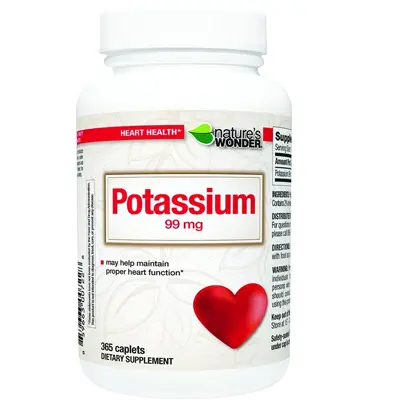
This potassium gluconate product is great for helping with cramps according to a large majority of user feedback. It still contains just 99% of potassium gluconate but we recommend it if you suffer from cramps that can sometimes be very uncomfortable and painful.
Product highlights
- Contains 99mg of potassium gluconate per serving
- Gluten-free
- 365 capsules
Ingredients
- Potassium gluconate
- Stearic acid, 2% or less of magnesium stearate
Who makes it
Nature’s Wonder Nutrition is a California-based company that offers a variety of products including vitamins, supplements, and nutritional support. Their mission is to “help you live wonderfully.”
Nutricost Potassium Citrate Capsules
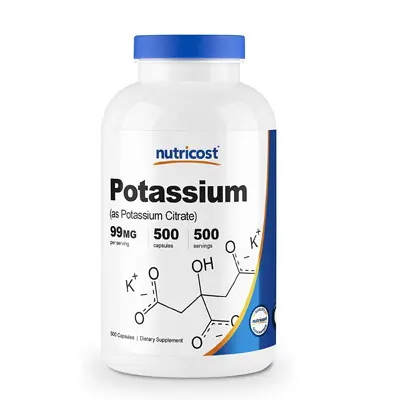
You’ve likely heard of Nutricost and that’s because it’s right up there with the best regarding the quality of their products and the variety of their offerings. These caps contain 99mg of quality potassium citrate, are gluten-free, and non-GMO. The product is also third-party tested for quality.
Users of this product find great results whether it’s helping with cramps, gout, kidney stones, you name it. Of course, user experience will vary but we have no reason to believe this isn’t a top-notch option.
Note: The lid may be blue or white.
Product highlights
- Contains 99mg potassium citrate per serving
- 500 capsules per bottle
- Gluten-free
- Non-GMO
Ingredients
- Potassium as potassium citrate
- Rice flour, capsule (gelatin), microcrystalline cellulose, vegetable magnesium stearate, stearic acid, silicon dioxide
Who makes it
Nutricost uses the best ingredients to create top-quality products. Their supplements are made to GMP standards and it’s hard to find better for the price. Their motto is “ONLY WHAT YOU NEED, NOTHING YOU DON’T,” which explains a lot about their mission.
Nature Made Potassium Gluconate Tablets
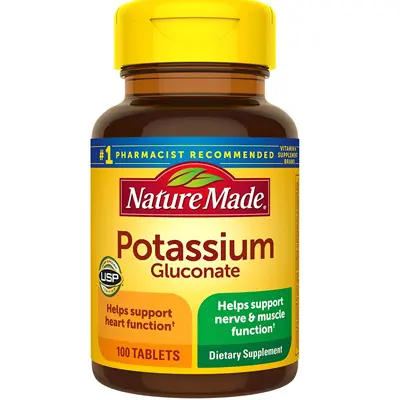
A #1 pharmacist recommended brand, Nature Made products have quickly made their way into the homes of millions, and for good reason.
A serving of this potassium product offers a quality dose of the active ingredient, from 550mg potassium gluconate, which is equivalent to 90mg (2%) potassium, a standard dose.
There are no colors, artificial flavors, no preservatives, and it’s gluten-free like our other picks and their products are USP verified to ensure nothing less than a quality experience.
Product highlights
- Contains 90mg of potassium
- 100 tablets per bottle
- USP tested for purity and potency
- Gluten-free
Ingredients
- Potassium (from 550mg potassium gluconate)
- Cellulose gel, stearic acid, croscarmellose sodium, magnesium stearate, silicon dioxide
Who makes it
Nature’s Made has been in business for over 45 years and so there’s no guessing or hoping that you’re getting a quality supplement. They test and make sure that their products are up to the highest standards.
Solaray Potassium Capsules
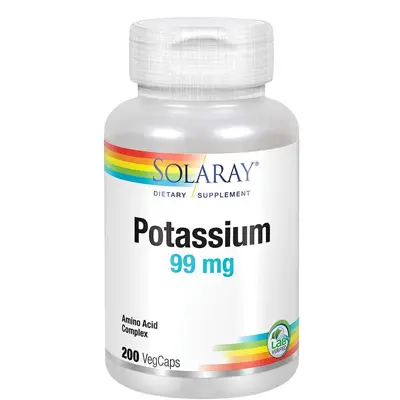
Solaray is a popular health store brand and you can never go wrong with any of their products (plus, the rainbow colors on the packaging is cool too).
With every serving, you get 3% daily value of potassium as an amino acid complex, which is enough to elicit the additional benefits of this mineral/electrolyte outside of your dietary intake. All it takes is one capsule a day to get your extra daily dose of potassium. There are also no unnecessary fillers used in this product.
Support heart health, rid cramps, and more with Solaray potassium caps.
Product highlights
- 99mg potassium (3% daily value) per serving
- 200 capsules per bottle
- Lab-verified
Ingredients
- Potassium (as potassium amino acid complex)
- Vegetable, cellulose capsule, rice flour, citric acid, magnesium stearate, parsley, Chamomile, and watercress
Who makes it
Solaray needs no convincing. It’s a top trusted brand that has been around since 1973 and they continue to innovate to offer some of the best products money can buy.
Thorne Research Potassium Citrate Capsules
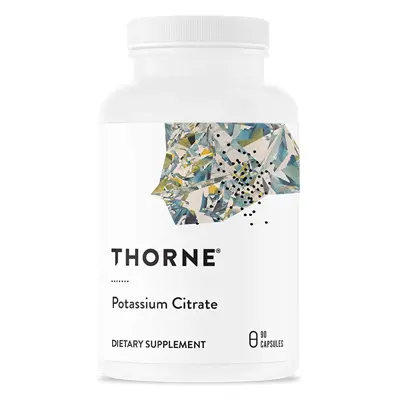
Thorne is one of the newer brands compared to some of the others that have been serving customers for decades. It’s a great brand for athletes especially because high-performance is non-negotiable when it comes to competition. But their research-backed products are excellent regardless of who you are or what you do. We recommend this potassium citrate product for aiding healthy muscle contractions, minimizing cramps, and overall health.
Thorne’s products are also designed for maximal absorption and contain no unnecessary fillers or additives which is added to the appeal of their supplement line.
Product highlights
- Contains 99mg potassium per serving
- 90 capsules per bottle
- Gluten-free
- Soy-free
Ingredients
- Potassium (as potassium citrate)
- Hypromellose (derived from cellulose) capsule, microcrystalline cellulose, leucine, silicon dioxide
Who makes it
Thorne Research provides medical professionals, athletes, and everyone else in between with innovative solutions. They’ve also partnered with U.S. National teams and the Mayo Clinic which is a testament to their mission.
365 Everyday Value Potassium Tablets
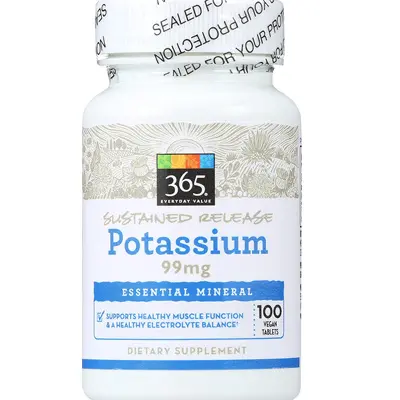
365 Everyday Value is a Whole Foods Market brand that provides a sustained-release potassium chloride for longer-lasting effects. Chloride isn’t found in foods but it’s often used and prescribed for low potassium levels over other forms. Although, you should not diagnose yourself by taking this supplement. But for maintaining general health it’s a viable option.
Product highlights
- Contains 99mg of sustained-release potassium chloride
- 100 tablets per bottle
- No preservatives
- Vegan
Ingredients
- Potassium (as potassium chloride)
- Dicalcium phosphate, hydroxypropyl, methylcellulose, stearic acid (vegetable source), microcrystalline cellulose, silicon dioxide, magnesium stearate (vegetable source)
Who makes it
365 Everyday Value is a product made for Whole Foods Market, an American USDA certified organic grocer that sells products free from hydrogenated fats and artificial colors, flavors, and preservatives.
Bulk Supplements Potassium Citrate Powder
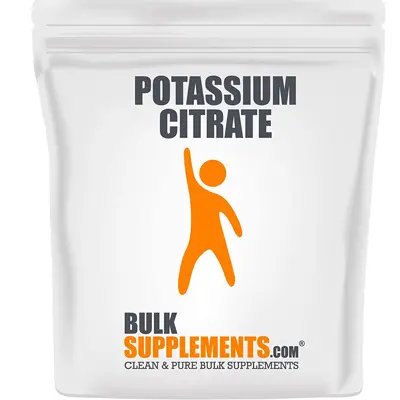
If you want the cheapest, quality option, then Bulk Supplements powders are always a top choice. They do offer capsules too but it’s totally up to you. We just figured we’d offer you something other than capsules if you either lie to save a little or make your own potassium capsules.
A serving has 98mg of potassium citrate and there are no other ingredients used in the powder option.
Product highlights
- Contains 98mg of potassium citrate per serving
- Lab-verified
- Third-party tested
- GMP-compliant
Ingredients
- Potassium citrate
Who makes it
Bulk Supplements is a large distributor of pure ingredient products. They offer products in small stand-up pouches and they supply brands with 25k drums and pallets of raw material to make their own products.
Solimo (Amazon Brand) Potassium Caplets
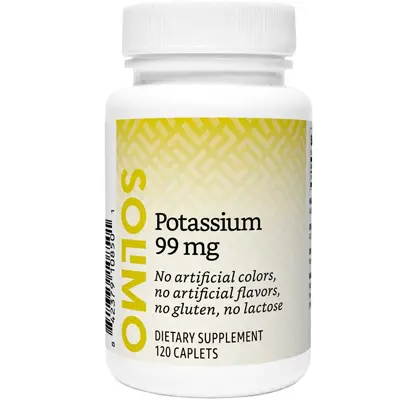
Solimo brand is a good overall value that provides quality products for less. This is a no-frills potassium supplement that’ll help to fill in your needs. It also helps that it’s the house brand so if you don’t like it, they’ll surely make things right.
Product highlights
- Contains 99mg potassium gluconate per serving
- 120 caplets per bottle
- Gluten-free
Ingredients
- Potassium gluconate
- Stearic acid, 2% or less magnesium stearate
Who makes it
Solimo is an Amazon brand that offers quality products at a cheaper price.
EarthBorn Elements Potassium Bicarbonate Capsules
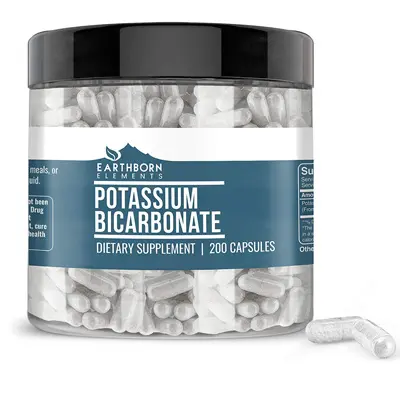
Earthborn Elements potassium bicarbonate capsules are last, but certainly not least on our list. It’s a high-dose product that is versatile regarding its benefits as it’ll help to maintain bone health, reduce cramps, support muscle function, and more.
Product highlights
- Contains 297mg (22%) of potassium from 800mg Potassium Bicarbonate
- 200 capsules per bottle
- Lab-tested
- High potency
Ingredients
- Potassium (from 800mg Potassium Bicarbonate)
- Gelatin capsules
Who makes it
Earthborn Elements provides quality products that have as little impact on the Earth as possible, hence the name.
How We Ranked
There are a few criteria that we consider before recommending any product.
Effectiveness
When it comes to determining the effectiveness of a supplement, we look at the main ingredients, amount per serving, company manufacturing practices, and user feedback. The product needs to offer a therapeutic or effective dose of the ingredients and many times this varies, as does the ingredient quality.
We select products from brands or companies that we know focus on quality and we’re confident that you’re getting what it advertised on the label. So we don’t think quality should be a concern with these picks.
Overall value
We consider a good value to be a combination of…
- Quality of main ingredients
- Amount of servings for the price
- Company reputation/history
Who Should Buy a Potassium Supplement?
If you’re a healthy individual who is not under the care of a medical professional or taking medications, then a potassium supplement is good to add to your daily health regime to possibly help fill in the gaps where you may not get enough through your diet alone. Although, most supplements don’t offer a whole lot for boosting potassium levels. That’s why you should already be eating potassium-rich foods.
People under medical care may also get clearance to take potassium supplements as part of their daily health regime.
Potassium is a bit different than other supplements due to the unique dosing of most products. We’ve provided more details on this below.
How Should I Pick A Good Potassium Product?
- Ingredients – The product should contain an effective dose of the main ingredient/s. Any other ingredients in the product should be minimal and/or safe for consumption.
- Brand reputation – Many brands have been around for a while and have built a solid reputation. They disclose their ingredients, make known their manufacturing practices with certifications, and have a loyal fanbase. But this can also be said for newer companies with the same credentials and satisfied users.
- Value – A good value offers a respectable amount of the key ingredient/s with an appropriate number of servings for a price that reflects what the product offers.
- Key Ingredients content – Potassium comes in various forms that may offer an advantage over the other. Although, based on our findings, if a potassium product is from a reputable company and good user feedback then a lot of the different forms perform to a similar degree.
- Convenience factor – Most potassium supplements come in capsule form which is arguably the most convenient delivery method. There are powder and liquid supplements too that may require an extra step to measure and mix with liquid (and to drink the liquid), but overall, these methods are still pretty convenient.
Potassium Benefits/Functions
Potassium, as you probably know by now, is a mineral and electrolyte that is essential for health. It’s an essential macromineral along with magnesium, calcium, sodium, phosphorus, chloride, and sulfur. We have to get potassium from food as our bodies don’t produce it.
About 98% of potassium is found in cells, while 80% is found in muscles and 20% is contained in red blood cells, bones, and liver (1).
Because potassium is an electrolyte, it creates electricity in the body which is essential for maintaining various processes such as nerve impulse, muscle contractions, and fluid balance.
Let’s talk about its important roles in the body.
Heart health/sodium and potassium balance
Both potassium and sodium are important for maintaining balance in the body although both have been linked to cardiovascular disease.
High salt intake can increase blood pressure to unhealthy levels, and potassium is the main regulator of extracellular fluid volume, including plasma volume. Potassium can help to relax blood vessels thereby allowing for better blood flow and consequently, lower blood pressure.
We need more potassium than we do sodium, however, many of the highly processed foods that we have access to these days are loaded with sodium. This is a problem and a contributor to hypertension and less than optimal health because, for many people, there’s no healthy nutritional balance.
According to an article from the Harvard School of Public Health, “Americans average about 3,300 milligrams of sodium per day, about 75% of which comes from processed foods, while only getting about 2,900 milligrams of potassium each day.”
One study published to Jama Network found explained that a higher sodium-potassium ratio significantly increases the risk of developing cardiovascular disease and all-cause death in the general U.S. population, which is alarming (2).
Researchers found that people with the highest ratio of sodium to potassium in their diets were double the risk of dying of a heart attack than those with the lowest ratio. Not to mention, they had a 50% higher risk of death from any cause.
Eating a healthy diet containing potassium-rich foods and less sodium will ensure that most people maintain optimal heart function.
Nervous system function, heart and muscle contractions
Potassium is crucial for the nervous system function and muscle contractions.
The nervous system is made of nerve cells or neurons throughout the body. Its role in the body is to receive information via the communication between the brain and body and cause a reaction to an experience (e.g. muscle movement and contractions, feeling pain, etc) (3).
The messages between the body and brain create nerve impulses that regulate bodily functions. Low potassium can interfere with this process, affecting the body’s ability to create nerve impulses (4).
Consequently, this weakens muscle contractions and can compromise a normal, healthy heartbeat, which can become a serious concern (5).
Stroke
Low potassium levels have been linked to increased risk of stroke, which occurs when there’s a lack of blood flow to the brain. Another reason why it’s important to ensure that you’re consuming enough potassium in your diet.
In one review of meta-analyses involving 128,644 participants, those who had a higher potassium intake had a 24% lower risk of experiencing a stroke (6).
Diabetes
Obesity is a prominent risk factor for Type 2 diabetes although other metabolic factors also play a role. But sufficient potassium intake is essential for insulin secretion from pancreatic cells, and low potassium levels can affect insulin secretion, resulting in glucose intolerance.
Bone health
Optimal potassium levels have been associated with bone health. The exact science behind the reason why isn’t entirely understood, however, one hypothesis is that potassium may help to protect bones against metabolic acidosis from eating acid-forming foods such as meats and cereal grains.
There are a few studies that have shown potassium intake to be beneficial for maintaining bone mineral density. One study of 52 men and women who either took 60 mmol/d, 90 mmol/d of potassium citrate, or a placebo for 6 months, found that the potassium significantly reduced calcium excretion. It was concluded that potassium has the potential to improve skeletal health (7).
Kidney stones
The two most common types of kidney stones contain calcium oxalate or calcium phosphate. Well, low potassium levels can impair the reabsorption of calcium in the kidneys and result in hypercalciuria and kidney stones.
Different Forms of Potassium
There are several forms of potassium found in supplements that include: citrate, gluconate, bicarbonate, chloride, aspartate, phosphate, and orotate. We’ve included all but one or two not because we think that one form is significantly better than the other, as there may be some uniqueness between products. But we wanted to offer products from reputable companies that have been tested by customers and that we think are quality options.
Here’s a little breakdown of the different forms of potassium commonly used in supplements.
Citrate – a urinary alkalizer, citrate makes the urine less acidic. It’s also used for a kidney stone condition called renal tubular acidosis, and it may help with kidney stones from gout.
Gluconate – classified as a food additive by the FDA, gluconate is also used in supplements to prevent low potassium and to support heart health and nerves.
Bicarbonate – bicarbonate is an alkaline mineral this compound is used in food items. For example, it’s used as a carbon dioxide for leavening in baking, it can substitute for baking powder which is ideal for low-sodium diets, it’s used to regulate PH, soften carbonation, and more.
Bicarbonate is also used as any potassium supplement to maintain healthy heartbeats, reduce cramps, etc.
Chloride – potassium chloride is typically used for low levels of this mineral whether a deficiency is due to disease, diarrhea, taking medications, etc. Although, it’s used for other purposes that you’d typically use potassium for.
Aspartate – aspartate is a combination of potassium and the salt form of aspartic acid which is an amino acid. It helps the potassium to work faster by entering directly into the bloodstream rather than passing through the liver.
Phosphate – phosphate is used as a laxative and to replace electrolytes. It plays a big role in energy storage, osteoblastic and osteoclastic activities, regulating serum calcium concentrations, and numerous cellular phosphate-transfer reactions.
Orotate – potassium orotate is a mineral transporter when potassium is bound to orotic acid. It improves potassium delivery into cells and helps to stabilize cellular acidity, and supports glucose metabolism and low potassium levels.
Side Effects
You’ve probably noticed that most potassium supplements in our review only contain 99mg of potassium, and there’s a reason for this. Some products containing potassium chloride and that contain more than 99mg potassium have been associated with small-bowel lesions. Consequently, the FDA requires that if certain potassium salts contain more than 99mg, then companies must include a warning label about the potential for small-bowel lesions.
Recommended Dosages
There isn’t sufficient evidence to suggest a recommended daily allowance (RDA) for potassium. However, the National Academy of Medicine has established an Adequate Intake (AI) for potassium of which we’ve provided below. And according to literature published to the National Institutes of Health, a proper potassium balance cannot be maintained with less than 400–800 mg/day.
Adequate Intake recommendations for potassium:
- Women 14-18 years (2,300 mg daily)
- Women 19+ (2,600 mg)
- Pregnant and lactating women (2,500-2,900 depending on age)
- Men 14-18 years (3,000 mg)
- Men 19+ (3,400 mg)
The estimation of average daily potassium intake in adults is about 2,320 mg for women and 3,016 mg for men.
Supplementation recommendations
Because there have been warnings about potassium intake in supplement form, you should never exceed the recommended dosages, which is typically 99mg per serving for most supplements. We can only recommend that you follow the instructions for safe supplementation.
What Foods Have Potassium?
Surprisingly, a lot of foods contain potassium, although fruits and vegetables typically contain the highest amounts. But legumes, potatoes, meats, fish, dairy, nuts, brown rice, and a few other food items have potassium too.
Among the most potassium-rich foods include dried apricots (1,101 mg per half cup), lentils (731 mg per 1 cup cooked), baked potato (613 mg per 1 medium flesh only), prunes, bananas, acorn squash, orange juice, and spinach to name a few.
The body can absorb 85-90% potassium from food sources. Citrate, sulfate, phosphate, and other forms are contained in foods except for potassium chloride, a form typically used in salt substitutes and some supplements.
We recommend eating lots of fruits and vegetables to get a healthy daily dose of potassium!
What About Potassium Deficiency?
A deficiency in this crucial element can be very dangerous and cause severe health problems. In many cases, potassium is prescribed for those with lower than normal levels. Normal blood potassium levels are about 3.6 to 5.2 millimoles per liter (mmol/L), and levels much lower or higher than this can cause issues.
Deficiency can cause:
- Hypokalemia
- Increased blood pressure
- Salt sensitivity (sodium affects blood pressure to a great degree)
- Kidney stones
- Urinary calcium excretion
Hypokalemia can vary from mild to moderate and more severe, with mild symptoms including weakness, fatigue, constipation, and malaise. Moderate to severe Hypokalemia can cause Polyuria which is the production of abnormally large volumes of dilute urine. It can also result in encephalopathy in patients with kidney disease; muscular paralysis, poor respiration, glucose intolerance, cardiac arrhythmias, and in the worst of cases, death due to its effects on heart function.
Hypokalemia is seldom caused by inadequate potassium intake alone, as an excess loss of fluids can lead to a deficiency or a lack of replenishment is typically a culprit. Vomiting, diarrhea, and diuretics can largely contribute to Hypokalemia.
People with inflammatory bowel disease such as Crohn’s and ulcerative colitis are at risk for potassium deficiency as these conditions are associated with chronic diarrhea. You also have to be careful with laxatives and enemas as well, for obvious reasons.
What about consuming too much potassium?
Consuming too much potassium can result in hyperkalemia. A mild case of hyperkalemia is not usually a serious problem but when levels are excessive, this can cause life-threatening cardiac arrhythmias, muscle weakness, or paralysis. But those with healthy kidney function are much less likely to develop this problem because the kidneys function to maintain normal levels by ridding excess amounts through urine.
People with a compromised renal function and who are taking medications that could contribute to Hyperkalemia should avoid consuming too much potassium.
FAQs
Will potassium supplements bring my low levels to normal?
Not likely. While potassium supplements can provide a boost in mineral levels, most supplements can only contain 99mg (2-3%) of potassium per serving.
Is food or supplements better for getting my potassium?
Food always wins when it comes to maintaining healthy potassium levels as supplements can only supply a low dose due to the potential safety risk.
Are potassium supplements useless?
No. While supplements cannot legally supply a large dose per serving, they are still beneficial for ensuring that you get a little more potassium in your diet.
Recap
We hope that you enjoyed this review of the best potassium supplements, and if you were concerned about not getting enough of this mineral in your diet, you now have ten top-notch options to choose from.
Potassium is essential for heart health, nerve function, muscle contractions, balancing sodium levels, and more. And while you may eat potassium-rich foods, quality supplementation is never a bad idea!
If you have any questions about the information in this article, leave them below and we’ll get back to you. We also welcome comments too. Also, check out the Best Citrulline Supplements Reviewed for 2024!
Tip: If you're signed in to Google, tap Follow.


